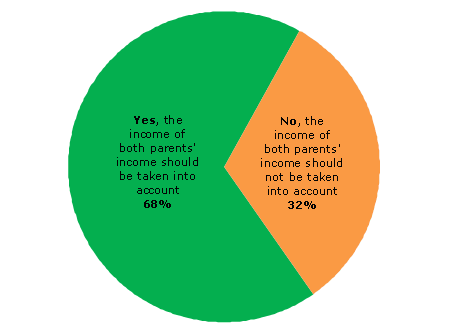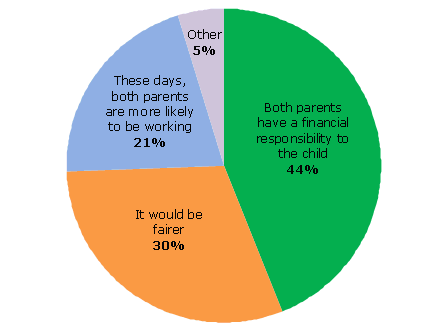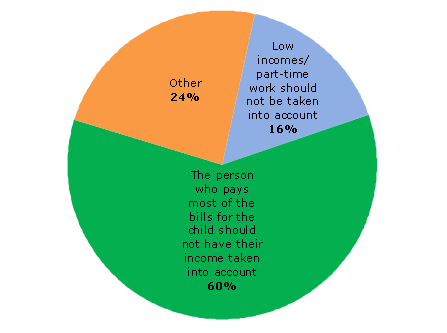Chapter 4 - Taking both parents’ income into account
On the basis that both parents should be financially responsible for raising their child, the discussion document outlined options for taking into account the combined income of both parents (as if the parents were living together).
Under this approach, the expenditure for raising the child would be divided between parents according to their respective share of that combined income and their respective levels of care of the child. A separate adjustment to a parent’s child support income would be made to take into account other dependant children living in that parent’s household.
Results of online consultation
Q1: Do you think the income of both parents should always be included in working out the amount of child support payable?

Note: The view that both parents’ income should always be taken into account was particularly prominent amongst paying parents. Some 88% of paying parents felt that both incomes should be taken into account, compared with 37% of receiving parents.
Q1(a): If you think that both incomes should be taken into account, why?

Q1(b): If you do not think that both incomes should be taken into account, why not?

Summary of comments on taking both parents’ income into account
Effect on work incentives
Many submitters expressed support for taking both parents’ income into account, reinforcing the view that both parents should have financial responsibility for their children. One of the concerns raised about the “income shares” approach, however, is the impact that it could have on work incentives for parents. It is argued that including receiving parents’ incomes will create a disincentive for them (in particular mothers looking after young children) to return to the workforce.
Many submitters – in particular receiving parents – also thought that the person who predominantly pays for the care for the child should not have their income taken into account.
Taking the income of the family unit into account
Although not recommended in the discussion document, comments were received as to whether the income of the whole family unit, including the income of a parents’ new partner, should be taken into account. Many submitters thought that the income of a new partner should be included. The adequacy of the level of the living allowance suggested in the discussion document was also questioned, in particular for individuals with higher incomes.
Definition of income
Another recurring concern related to the definition of income – in particular, the perceived ability of paying parents who are self-employed (and others) to manipulate their income for child support purposes in order to minimise payments. To that end, various comments were received suggesting that all income sources including, for example, family trusts, be included.
Comments on taking both parents’ income into account
General comments on taking both parents’ income into account
“I believe this is only fairer if consideration of how much care is provided by either parent is also applied to the formula.”
Effect on work incentives
“In my situation I have the children for the majority of the working fortnight – I act [as] a free childcare (to some degree for my ex-partner) which allows him to work whatever hours are needed at his work – this also allows him to further his career and take additional training opportunities that aren't anywhere nearly as easy for me to pursue. I consider I'm financially disadvantaged enough!”
“The custodial parent's income should not affect the non-custodial parent’s responsibilities for their children. The paying parent's liability should be based on THEIR ability to pay, not on the recipient parent's income. Custodial parents would be discouraged by the fact that any increase in their own income, would cause a decrease in child support. This would create a disincentive to work, or to better themselves. It would create an incentive to work ‘under the table’.”
“This is the proposal of most concern to me. [It] disincentivises custodial parents to return to work and make a better life for themselves. For higher earning custodial parents this approach does not take into account the opportunity cost and other ‘soft costs’ associated with being [the] primary caregiver. Also, where do you draw the line with looking at partners of parents and their income? It's a slippery slope.”
Taking the income of the family unit into account
“I would go further and say that where they have remarried / repartnered the total income of that family situation ought to be taken into account.”
“I think a fairer approach would be to look at the “household income” when determining how much either parent should contribute to a child’s welfare. Some cases show that a mother with the main care of her child has a low ‘personal’ income, thereby increasing the amount the other liable parent would be asked to pay, but she may be living in a situation where her income is substantially subsidised by a new partner... which is never obvious when looking at her income alone.”
“I believe new partner’s incomes should also be taken into account. Where the custodial parent takes on a new partner, that partner does and should accept the complete package, including the children of a previous relationship. In the case of [the] paying parent a new partner likewise, does and should accept the responsibility the partner has for children who reside elsewhere.”
“Both parents should be equally responsible for the costs of raising their children. Irrespective of what income a person has, the basic cost of raising a child does not change, therefore what a person earns, any new relationships or children should have no bearing on the base rate that they pay.”
Definition of income
“Why is the living allowance so low? Surely if you earn $80k you would spend more on yourself per year than $16,054? If you are basing child support payments on income, then shouldn't you base the living allowance on income too? This should be relative to income and not a set amount.”
“Income” should also include any Working for Families tax credits etc that either parent may be receiving (or this should offset any liability calculations).”
“All income should be looked at even when assets and such are placed in trusts to dodge tax systems.”


